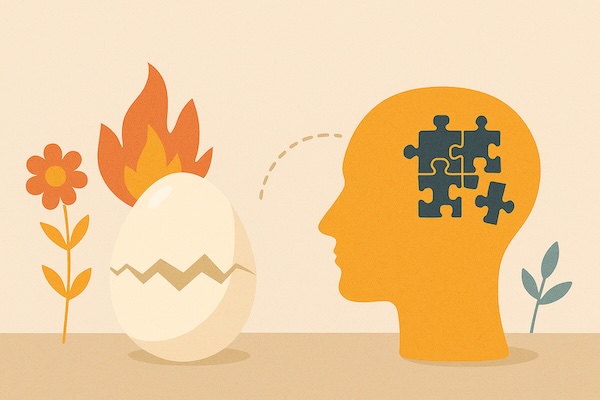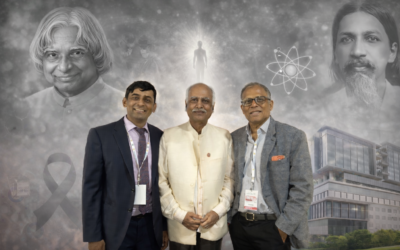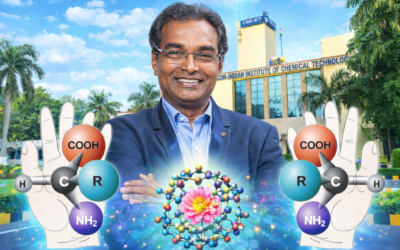
Unboiling the Egg
The phrase ‘unboiling the egg’ evokes the impossible: once heat has transformed the contents of an egg, there is no turning back, no means of returning the yolk and white to their original, separate, fluid states. This commonly used analogy has helped convey the futility of attempting to reverse certain processes—whether physical, emotional, or psychological. Mithu Storoni uses this metaphor in her 2017 book Stress Proof. A medical doctor from the University of Cambridge and a doctorate in neuro-ophthalmology at the National Hospital for Neurology and Neurosurgery in London, she mentioned that under specific laboratory conditions, it is possible to ‘unboil’ a hen’s egg.
This led me to learn about the Ig Nobel Prize, a word play on ignoble. It is a light-hearted take on the Nobel Prize, which began in 1991, celebrating something unusual yet significant. To drive home the irony, a lone banknote of 10 trillion Zimbabwean dollars is presented, which is actually worth only about US$0.40.
Researchers at the University of California, Irvine, and Flinders University in Australia, led by Colin Raston (b. 1950), won the 2015 Ig Nobel Prize in Chemistry for developing a Vortex Fluidic Device (VFD) that can ‘unboil’ proteins in an egg, effectively reversing the protein-folding process caused by cooking. While the method doesn’t fully restore the egg’s original state, it untangles the denatured proteins and returns them to a clear, fluid state.
So, instead of laughing it off, I saw this development cast the metaphor in a new light, inviting us to reconsider our assumptions about change, especially in the context of mental conditioning and personal growth. Can we, like the laboratory egg, ‘unboil’ our own minds, shedding layers of learned behaviour or trauma to become better versions of ourselves?
From birth, people’s minds are shaped and reshaped by countless influences—family, society, education, trauma, success, and failure. The traditional outlook is that mental impressions are permanent, etched forever upon the consciousness. Once trust is broken, can it ever be fully restored? Once trauma is experienced, can its effects ever truly be erased? In this framing, attempts at self-improvement or recovery may seem Sisyphean—meaningful, perhaps, but ultimately unable to undo the past.
Thus, ‘egg boiling’ is seen as the process of mental conditioning: each experience, lesson, or hardship is like heat, denaturing the proteins of our psyche, binding us into new forms. Over time, neural pathways are established, habits are formed, and patterns of thought become solidified. Just as a hard-boiled egg is the product of heat and time, so too are our personalities, anxieties, and worldviews the result of accumulated experiences and learned responses.
By adding a chemical agent and using a vortex fluid device, Raston restored cooked proteins to their original, uncooked state. This breakthrough, meant for biomedical research and protein manufacturing, also presents a potent metaphor: with the right tools and knowledge, even changes once thought irreversible can be undone—or at least reconfigured.
So, if protein ‘denaturation’ can, in some circumstances, be reversed, might we also find ways to unbind the hardened, conditioned responses of our minds? While we cannot return to a true psychological ‘blank slate,’ modern psychology and neuroscience suggest that profound change is possible through neuroplasticity, therapy, introspection, and new experiences. The brain, far from being fixed, is dynamic and adaptive.
Essentially, mental conditioning encompasses the beliefs, biases, fears, and habits formed over a lifetime. These are not always negative—indeed, conditioning is essential for survival—but some patterns become maladaptive. Phobias, negative self-talk, prejudice, and self-limiting beliefs are examples of ‘overcooked’ responses that may no longer serve us.
Modern research in neuroscience has shown that the brain has the ability to form and reorganise synaptic connections, called neuroplasticity, in response to learning or experience. Therapy modalities such as cognitive-behavioural therapy (CBT), mindfulness, and even psychedelic-assisted sessions can make individuals ‘rewire’ their responses to past events and unlearn maladaptive patterns. The Internet is full of stories of people who have overcome addiction, healed from trauma, and abandoned deeply held prejudices. The evidence is clear: mental ‘unboiling’ is not only possible, but happening all around us.
I have yet to see anyone who has changed personally. Actually, I don’t believe in this idea of ‘change’. In fact, my doubt is more fundamental. What does it mean to be a ‘Better Person’? Isn’t becoming better inherently subjective, shaped by culture, context, and personal values? For some, it means cultivating compassion and empathy; for others, it might mean gaining confidence, shedding destructive habits, or finding peace with oneself. Regardless of the specifics, self-improvement implies movement away from past limitations and toward a higher ideal.
Change is seldom straightforward. The inertia of habit, fear of failure, and the comfort of the familiar can all conspire against us. Shame and guilt may keep us rooted in old patterns, and sceptics—both internal and external—may insist that ‘people never really change’. I prefer terms like ‘awareness of our inner world’ that keep radiating outwards, as in the behaviours and words we speak, our voice, tone, speed, and fluency, or the hindrances.
Why give a common-sense assessment of one’s strengths and weaknesses, and then attach a high-sounding name to it? Dialogue with trusted friends has always helped people. Community, mentorship, and professional guidance are invaluable. Who can deny that small, consistent efforts lay the groundwork for lasting improvement? The root problem of our times is isolation. Mistakes are inevitable; learning from them is key. You need good people around you to help you correct your mistakes, not your nemesis.
While the metaphor of ‘unboiling the egg’ suggests radical reversal, true personal growth often involves integration rather than erasure. We cannot unlive our childhoods or forget our traumas, but we can reinterpret, reframe, and rise above them. Like the egg’s proteins, our minds may always bear traces of their former shapes, but that need not define us.
There is no denial of the fact that the story of unboiling the egg is now a symbol of possibility. Scientific progress mirrors personal growth: what was once thought unchangeable can, through persistence and the right tools, be transformed. Though we cannot return to some untouched, original state, we are not prisoners of our past. Mental conditioning can be examined, challenged, and, to some extent, undone.
Becoming a better person is not only possible—it is our birthright as adaptable, learning beings. The process may not be easy or complete, but each step toward greater self-awareness, compassion, and freedom from harmful conditioning is an unboiling of sorts: a reclamation of potential, a renewal of hope, and a testament to the endless capacity for change within us all.
MORE FROM THE BLOG
Those Who Transcend the Known
The best part of my career has been meeting eminent people and learning—often quietly—about the many facets of human excellence—something missed by those who pursue excellence in their own fields and live within their silos and echo chambers. Even now, when I travel...
The Alchemy of the Balcony
I have been deeply engrossed in reading Shakespeare for a while. It remains one of the most astonishing paradoxes in literary history that Romeo and Juliet—a drama pulsing with murder, deception, impulsive rebellion and ethical transgression—has been remembered across...
A Scientist and a Gentleman
In every civilisation, there are two measures of success. One is public and noisy—titles, awards, positions, headlines, and the temporary glow of importance. The other is almost invisible: the quality of a human being. History remembers the first for a moment and the...





Dear Sir, Greetings! “This is a brilliant piece—I love the jump from the Ig Nobel Prize to neuroplasticity! Your final distinction between ‘change’ and ‘awareness of our inner world’ is the key takeaway. It brings us back to the idea of the Atman (the Witness) in philosophy: we can’t ‘unboil’ the experience, but we can untangle the denatured response. The true ‘Vortex Fluidic Device’ for the mind seems to be not erasing the past, but achieving the integration you speak of—allowing the self to be defined by awareness and choice, not just conditioning. Thank you for inviting this vital introspection!” Warm Regards,
While we cannot completely unboil the egg of our conditioning, we can soften its shell — reintroducing fluidity, curiosity, and conscious choice into the self. The goal is not to become the raw egg again, but to become aware that we were once liquid — and that the mind can, with warmth and wisdom, learn to flow again.
As I understood from your blog, it is by seeing conditioning for what it is — noticing patterns of thought that are inherited, not chosen, by asking “Who told me this was true?” or “What if I had been born elsewhere? Intentionally cultivating new patterns (compassion, curiosity, courage) that dissolve rigid ones, and by accepting that total purity is an illusion, what matters is flexibility, not perfection, it is possible.
Delearning is the process of letting go of old beliefs, habits, or ways of thinking that no longer serve us. It sounds simple, but is often as difficult as unboiling an egg. Once our minds are shaped by experiences and repeated thoughts, those patterns become fixed and resistant to change. Yet, while we cannot completely erase what we have learned, we can soften its grip by becoming aware of it, questioning it, and replacing it with new understanding. Delearning, then, is not about forgetting the past, but about freeing ourselves from its control.
From a computer engineer’s perspective, habits and social conditioning resemble legacy code—deeply embedded, interdependent, and resistant to change. Just as unboiling an egg defies natural entropy, refactoring such “mental code” is rarely straightforward. Scientists may be able to reverse protein folding in the lab, but human behaviour involves not just logic but also emotional variables, cultural frameworks, and recursive loops of reinforcement. Breaking free is less about deletion than about debugging—finding inefficiencies, isolating bugs, and carefully rewriting subroutines without crashing the entire system. Whether humanity can ever engineer a true reset remains an open problem, a kind of “behavioural impossible problem.”
Breaking free from ingrained habits and social conditioning is as daunting as the metaphor of unpeeling an egg. Scientists may demonstrate how proteins can be coaxed back into earlier states, but human behaviour is woven with deeper threads—memory, emotion, culture, and fear of change. Unlike molecules, we carry narratives and attachments that resist reversal. Transformation, then, is not about erasing what shaped us, but about bending those patterns toward awareness. The challenge lies not in undoing but in transcending—choosing to reframe conditioning and create space for new possibilities. Whether this is truly possible remains humanity’s unanswered experiment.
This reflection captures beautifully the paradox of human transformation. The metaphor of unboiling the egg is powerful precisely because it straddles impossibility and possibility: while we cannot return to the untouched wholeness of a pre-lived life, we can reshape what experience has already altered. Trauma, memory, and conditioning leave their marks, much like denatured proteins never fully regain their pristine form. Yet growth does not require erasure. It asks for integration—the weaving of scars into stories, of fractures into strength.
Science here becomes a mirror: just as breakthroughs in molecular manipulation reveal that some “irreversible” processes can be bent back toward order, so too the human spirit learns to reinterpret what seemed fixed. The past may remain unaltered, but its meaning is never beyond renewal. Each reframing loosens the grip of old patterns, making space for freedom.
Thus, the unboiled egg is not a promise of erasure but of transformation. It reminds us that the mind, though conditioned, is not condemned. With patience, awareness, and the right tools for reflection, even the most entrenched patterns can be softened. We are shaped by our histories, yes, but not defined by them—always capable of becoming more than what was.
Thank you for reminding us that “Scientific progress mirrors personal growth: what was once thought unchangeable can, through persistence and the right tools, be transformed. Though we cannot return to some untouched, original state, we are not prisoners of our past. Mental conditioning can be examined, challenged, and, to some extent, undone.
Becoming a better person is not only possible—it is our birthright as adaptable, learning beings. The process may not be easy or complete, but each step toward greater self-awareness, compassion, and freedom from harmful conditioning is an unboiling of sorts: a reclamation of potential, a renewal of hope, and a testament to the endless capacity for change within us all”
.
It’s inspiring to think that, like proteins, our minds can be rewired, old patterns reshaped, not erased. True change may be gradual and personal, but your reflections remind us that even small steps toward awareness, compassion, and growth can reclaim potential and hope.
A beautifully woven blog Arunji. The metaphor of ‘unboiling the egg’ as a symbol of inner transformation is both poetic and powerful. It reminds us that change, though complex, is always within reach—with awareness, support, and the right tools. Thank you for this inspiring perspective. Learnt a new metaphor.